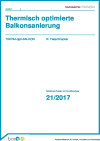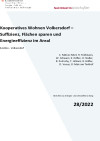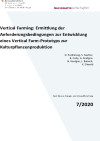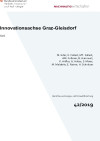Suchergebnisse für "Factsheet: Energietechnologien gestalten, die für alle sinnvoll und nutzbar sind"
BIMSavesEnergy - BIM-basierte Planungsmethoden zur Sicherstellung von Energie-effizienz im Bauprozess
Das Building Information Model (BIM) bewirkt grundlegende Veränderungen in Planung und Bau von Gebäuden, da durch die gemeinsame Datenbasis erstmals eine enge, organisationsübergreifende Zusammenarbeit in Bauprojekten möglich wird. In diesem Projekt wurden BIM-basierte Planungsmethoden entwickelt, die den Einfluss von Planungsentscheidungen auf die Energieeffizienz quantitativ bewertbar und im Managementprozess steuerbar machen.
Thermisch optimierte Balkonsanierung (THERM-opti-BALKON)

Bei der thermischen Sanierung von Gebäuden stellen frei auskragende Balkone ein besonderes Problem dar. Das Projekt hatte zum Ziel, die Grundlagen für die Entwicklung eines praxistauglichen und kostengünstigen Befestigungssystems zu schaffen, das die thermisch entkoppelte Wiedererrichtung der Balkone im Zuge der Sanierung erlaubt und damit die Effizienz der Wärmedämmmaßnahme deutlich verbessert.
Schriftenreihe
21/2017
N. Fleischhacker Berichte
Deutsch, 59 Seiten
Downloads zur Publikation
Kooperatives Wohnen Volkersdorf – Suffizienz, Flächen sparen und Energieeffizienz im Areal (KooWo - Volkersdorf)

Am Beispiel des gemeinschaftlich geplanten Wohnprojekts „KooWo“ in Volkersdorf soll Suffizienz umgesetzt und das übergeordnete Ziel einer ganzheitlichen Energie- und CO2-Reduktion erreicht werden. Das Wohnprojekt verschiebt die Systemgrenze von einer nutzflächenbezogenen zu einer personen- und Sozialgemeinschaft-bezogenen Betrachtungsweise und generiert durch einen kollektiven Lebensraum Einsparungspotentiale beim Ressourcenverbrauch pro Kopf.
Schriftenreihe
28/2022
C. Falkner-Merl, H. Feldmann, W. Schwarz, K. Höfler, H. Staller, R. Pertschy, T. Urbanz, R. Höfler, D. Venus, O. Mair am Tinkhof
Herausgeber: BMK
Deutsch, 84 Seiten
Downloads zur Publikation
Vertical Farming: Ermittlung der Anforderungsbedingungen zur Entwicklung eines Vertical Farm-Prototyps zur Kulturpflanzenproduktion

Im Mittelpunkt stand die Erforschung von Grundlagen für eine neue Gebäudetypologie, der Vertikalen Farm. Urbane vertikale Lebensmittelproduktion kann zur Steigerung der Energieeffizienz von und zur Reduktion des Landverbrauchs durch Städte beitragen. Wesentliche Einflussfaktoren zur Erreichung dieser Ziele werden durch diese Grundlagenforschung offen gelegt.
Schriftenreihe
7/2020
D. Podmirseg, S. Sautter, B. Cody, A. Keutgen, N. Keutgen, J. Balasch, K. Diwold
Herausgeber: BMK
Deutsch, 91 Seiten
Downloads zur Publikation
EPIKUR – Energieeffizienz-Potential intelligenter Kernverdichtung des urbanen Raums
Das gegenständliche Forschungsvorhaben befasste sich mit den Möglichkeiten, Implikationen und Rückkopplungen, die sich durch eine "Stadterweiterung nach innen" mittels innerstädtischer urbaner Verdichtung ergeben. Dabei wurde Nachverdichtung als paradigmenfrei untersucht, d.h. unabhängig von bestehenden Regulativen, sondern anhand des vernünftig machbaren.
G2G – Innovationsachse Graz-Gleisdorf
Entwicklung von Test- und Demonstrationsgebieten im Rahmen von ausgewählten Stadt(teil)entwicklungsvorhaben entlang der Innovationsachse Graz-Gleisdorf mit Fokus auf die Bereiche Energie, integrierte Gebäudetechnologien, smarter Stadtraum, kompakte Siedlungsstruktur, Nutzungsmix - Stadt der kurzen Wege, Generationenwohnen, intermodale Mobilität sowie Informations- und Kommunikationstechnologien (IKT).
Innovationsachse Graz-Gleisdorf (G2G)

Entwicklung von Test- und Demonstrationsgebieten im Rahmen von ausgewählten Stadt(teil)entwicklungsvorhaben entlang der Innovationsachse Graz-Gleisdorf mit Fokus auf die Bereiche Energie, integrierte Gebäudetechnologien, smarter Stadtraum, kompakte Siedlungsstruktur, Nutzungsmix - Stadt der kurzen Wege, Generationenwohnen, intermodale Mobilität sowie Informations- und Kommunikationstechnologien (IKT).
Schriftenreihe
42/2019
M. Eder, K. Fallast, MT. Fallast, AM. Fulterer, B. Hammerl, K. Höfler, G. Huber, S. Maier, M. Malderle, E. Rainer, H. Schnitzer
Herausgeber: BMVIT
Deutsch, 115 Seiten
Downloads zur Publikation
6D BIM-Terminal: Missing Link for the development of CO2 neutral buildings
The present project aims to close the gap between specialist consultants and Building Information Modeling (BIM) applications. For that, relevant data for cost estimation, scheduling construction planning and management or sustainable building operation and facility management, shall be added automatically to BIM elements and imported into the respective specialist planning software. This data exchange shall be carried out using IFC interface according to ÖNORM A6241-2 and the properties of the ASI properties server via a central platform, the "6D BIM-Terminal".
Energy optimised design rules and integral planning approach for building-integrated photovoltaics in urban areas (VITALITY)
The VITALITY project aims to provide supporting tools, design rules and robust information in the early decision and design phase of building projects. By providing the right information at the right time, building-integrated photovoltaics (BIPV) is part of the discussion in the concept phase and the implementation is strongly prepared and supported.
The Box - Thermal High Performance Decoupling - Next Generation Thermal Break Technology
The project pursues the overall strategic objective "solution of the problem-inducing heat bridge". For this purpose, the thermal bridging losses should be reduced by the factor of 15 in contrast to the state of the art. The significant increase in efficiency should rely on existing system solutions, but incorporating a new holistic view in terms of construction, geometry and materials.
Cooperative Living Volkersdorf (KooWo - Volkersdorf) - sufficiency, space and energy efficiency in the quarter
The jointly planned demonstration project "KooWo" in Volkersdorf aims at reaching sufficiency as well as energy and CO2 reductions in a holistic way. System boundaries are shifted in order not to look only at energy consumption in buildings, relating to unit of floor space, but to consider all use of resources and relating it to persons and social communities.
Biotope City - construction manual for the green city of the future
"Biotope City" is an overall concept for the implementation of comprehensive urban greening with the aim of using the regenerative mechanisms of nature. With this approach, quality of life is to be comprehensively, sustainably and cost-effectively increased and resilience against extreme weather events in cities will be improved. The project aims to generate realistic components of a "construction manual" for the green city of the future, which are generalizable and transferable.
VERTICAL FARMING - Investigation on requirements of a Vertical Farm-prototype development for crop plant production
In the center of interest stands the investigation of fundamental principles for a new building typology – the Vertical Farm. Urban vertical food production can contribute to more energy efficient cities by concurrently reducing land use. Substantial influencing factors to achieve these goals are intended to be revealed.
G2G – Innovation axis Graz-Gleisdorf
Development of testbeds and demonstration zones within already designated areas for urban development along the Graz-Gleisdorf Innovation-Axis with a focus on energy, integrated building technology, smart city-spaces, compact settlement structures, generational living, and ‘cities of short ways’. It will pay specific attention to intermodal mobility as well as ICT-based solutions.
EPIKUR – Energy efficiency potential of intelligent measures of urban densification
The present research proposal focused on the possibility, implications and consequences of "inwards urban expansion" through densification of the existing urban tissue. In this context, densification is not only approached through known and common aspects of building regulations and guidelines, but in view of what is actually possible to achieve.
BIMSavesEnergy - BIM-based planning-methods for the assurance of energy-efficiency in the building process
The Building Information Model (BIM) brings about fundamental changes in the planning and construction of buildings, as the common base makes it possible to work closely together across disciplines in construction projects. In this project, BIM-based planning methods were developed, which make the influence of planning decisions on energy efficiency quantifiable and controllable in the management process.
Probing for PV façade systems made of lightweight plastic modules with reversible fittings for new and old buildings (PV-FAS_light + easy)
Probing for a new, simple, cost-effective and building-integrated PV facade system made of plastic PV modules through initial investigations for fixing technology, for building physics, for fire protection and for electrical engineering concerning the usability, the areas of applicability and the yield and application potentialfor new buildings and for existing buildings.
metaTGA - Metadata and process models for open BIM in building service engineering
The objective of this research project is to design a methodology for developing data and process models and to apply them by modelling selected MEP systems. A particular but not exclusive focus is put on the renewable heating technologies, e.g. heat pumps, solar heat and biomass as well as ventilation systems. The data and process models developed in this research project will be scientifically evaluated in two pilot projects. The models, the approaches taken during development and the project team’s experiences with the pilot application of the models will be disseminated openly.
